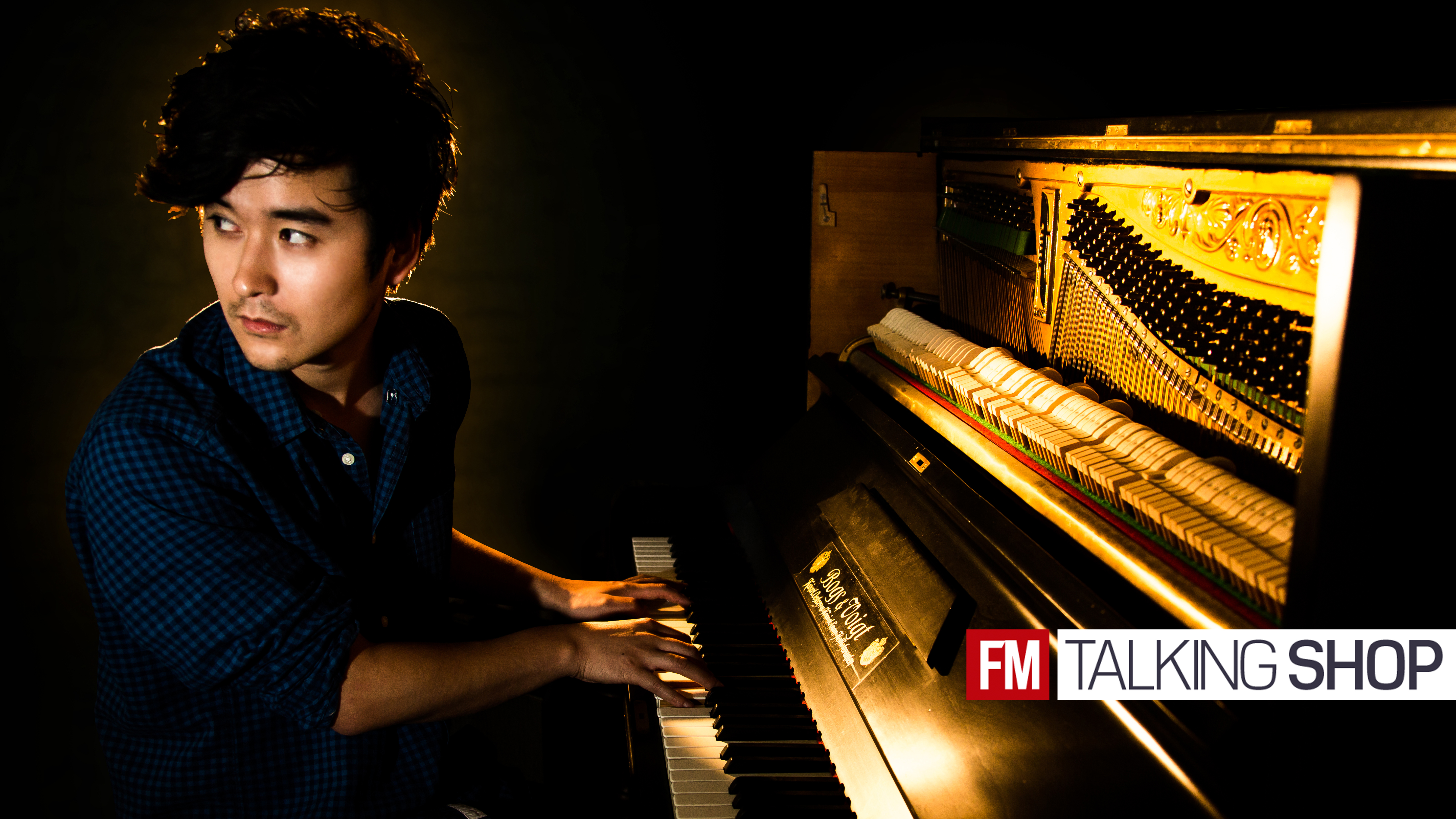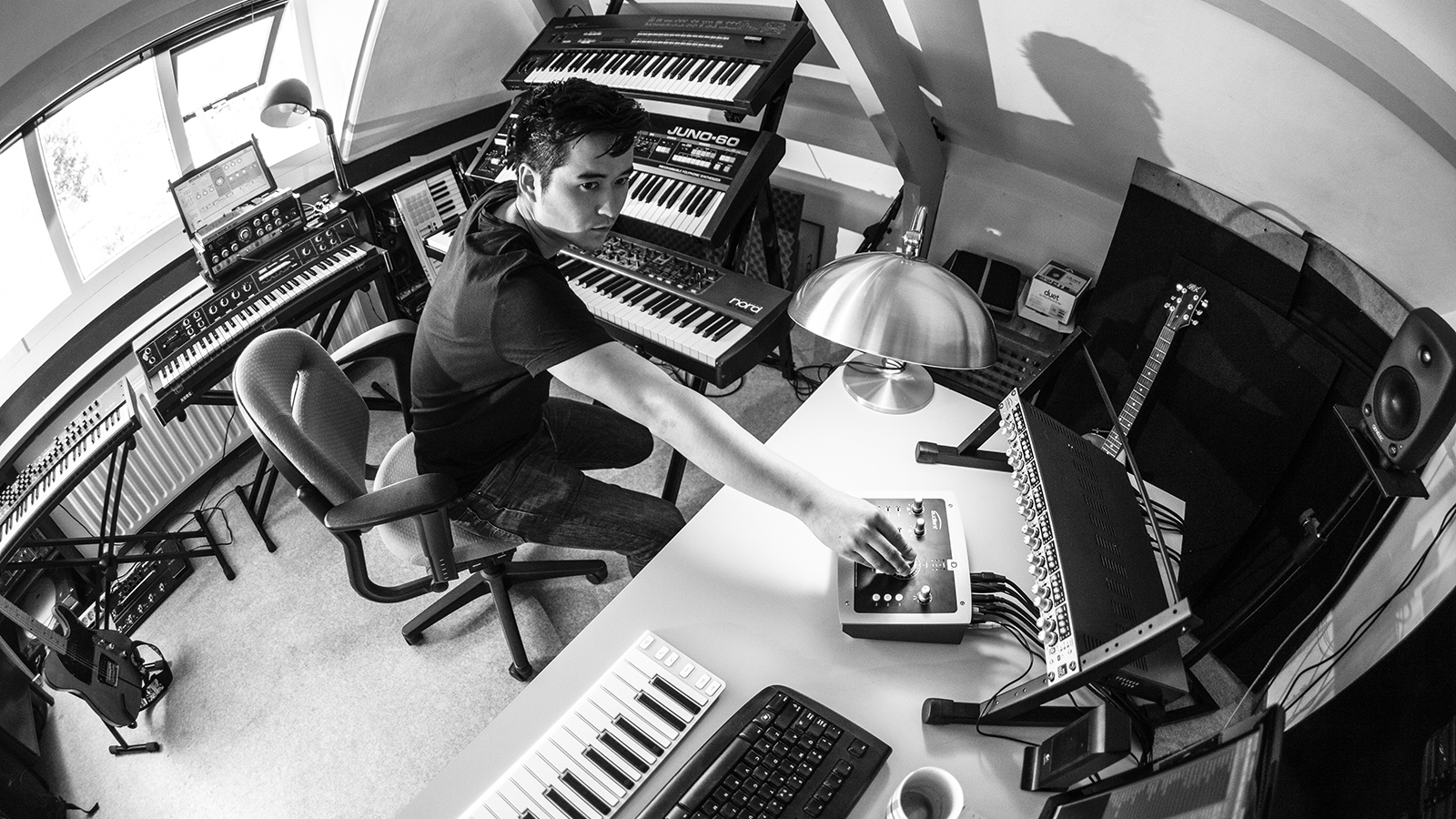Talking Shop: Shook
We talk synths and production with the Dutch producer

With his third album Spectrum out now, FM caught up with Dutch producer, multi-instrumentalist and Jazz Fusion fan Shook to chat about his approach to creating sounds, and why he can't bear to be parted from a single one of his synths.
Fancy having a go at remixing Shook's track Milestones and being in with a chance of winning a year's subscription to Future Music at the same time? Then check out Audient's remix competition. Download the stems and submit your remix before 5 January to enter.
When did you start making music, and how did you first get started?
"It started with the piano, which is still my main instrument. I have played for as long as I can remember. I started making music on the computer when I was around twelve. It was a good way to entertain myself because I grew up in a small village in Holland where there is not much to do. I first started making very dark experimental music like Drum 'n' Bass, Techno, Hip Hop, all kinds of stuff! There were a lot of artists that influenced me during that process. Nowadays I get a lot of inspiration from '70s and '80s electronic pioneers and Jazz Fusion musicians."
Tell us about your studio/set-up
"I first had a studio in my bedroom apartment but had to move out because of the noise I was making in the late hours. I now live in an apartment where I could make music in the day time only, but eventually I moved all my gear to yet another place where I can produce whenever inspiration strikes. I think that's pretty important for me in the creative writing process. When I am not near my studio I record ideas on my mobile phone."

What DAW (or DAWs) do you use, and why did you choose it?
Get the MusicRadar Newsletter
Want all the hottest music and gear news, reviews, deals, features and more, direct to your inbox? Sign up here.
"I have been making music with FL Studio since the first version. I still use it today, it has every feature that I want. It's the fastest way for me to make something that is in my head."
What one piece of gear in your studio could you not do without, and why?
"I know this is not a proper answer to your question, but that would have to be ALL of my synthesizers! I am very fond of my instruments. I try to figure them all out 100% and know their sweet spots. It's kind of like cooking where you have certain ingredients and know when to use the different flavours to cook a nice meal. For me it's kind of like the same with making a good song with my synthesizers - each has it's own character in sound and you can really paint colors in your music. If I had to choose one, I would say the Prophet 08 or the Juno 60. Haha, I'm sorry I can't choose! These two have been used a lot on my new album Spectrum."
What's the latest addition to your studio?
"My latest piece of gear is the ASP880 preamp and ID22. I love these! I really needed a good audio interface with loads of inputs, because I was used to plug everything out and in again. Now all of my instruments are hooked in from the start, so I don't have to worry about that anymore which leaves more room for creativity and music making. I also recently picked up an old Roland RE-201 Space Echo, which I used for a few of the tracks for Spectrum. I love the sound of tape and how you can manipulate the audio in multiple ways with it."
What dream bit of gear would you love to have in you studio?
"That's a tough one! First thing that comes to mind is the Arp 2600. When I was studying music and audio engineering I followed a class called sound synthesis. I remember the first lesson when my teacher introduced me to the Arp 2600 and a Nord Modular G2 in the class room. It was a pretty great way to get you excited about sound! I have a Nord Modular G2, but sometimes I think back to those times, so would love to have an Arp 2600 some day."
When approaching a new track or project, where do you start?
"It's different every time. You never know when inspiration strikes. It can be a rhythmic pattern you hear at the train station or a melody that I accidentally play while improvising on the piano or just a certain feeling you have. If I have an idea I record it in my phone and when I am back in my studio I start building up a sketch and just play it in.
"When starting a new song it's always fun, and I try to challenge myself to not do the same thing all over again. I really try to capture real emotions and that special feeling in a song. For me all elements in a song have to be in balance with each other, melodic, rhythmic and sound wise."
What are you currently working on?
"I just released my new album Spectrum. I am very happy to finally share it with everybody. The reactions have been great, I'm so lucky to have such a dedicated following!
"At the moment I am working on the live shows and searching for a new synthesizer to bring with me because my old Korg R3 just broke during a gig last week. The preset knob was basically broken and it freaked out when I tried to move it, luckily it stayed on the correct setting during the whole show!"
Shook's essential music making tips...
Don't rely too much on pretty visuals on your computer screen
"Don't stare too much at the screen and rely too much on visual information and settings and so on, but trust your ears instead. It can be very distracting to focus on graphical information that is happening in your DAW or the plug-ins you are using. When playing with different settings for hours and not actually going anywhere it often helps to turn off your monitor screen and dim all the lights and just listen to the track in a different perspective. It sounds very simple, but this can really help you to hear the mix better and know what can really improve your mix."
Sometimes it's a good idea to go back to your first few mixes
"When you are working on version 231 of a mixdown of a track, it's sometimes a good idea to go back to your first few mixes. I often go back to that first intuitive mix and find out it's the best and sounds the most natural sounding of them all. Maybe the settings are completely out of the ordinary and won't work on paper, but that's not really important. If it sounds good I just leave the fader alone and go with it. Maybe you would only need to adjust some small stuff like rolling off the bass end under 50Hz and so on. But I believe that sometimes your first natural feeling of a mix can be the right one."
Don't buy too much gear, but be creative
"I keep telling myself this, it's very tempting to get lost in lots of gear! But it's a good idea to get the best out of the stuff you already have. Whether they be plug-ins you own or instruments you have. Learn them, and know how to get the most out of them. It's with limitations you get creative. If you restrict yourself by trying to recreate an entire orchestra with one basic synthesizer, it's the limitations that gets you creative and often results in very interesting sounds."


Future Music is the number one magazine for today's producers. Packed with technique and technology we'll help you make great new music. All-access artist interviews, in-depth gear reviews, essential production tutorials and much more. Every marvellous monthly edition features reliable reviews of the latest and greatest hardware and software technology and techniques, unparalleled advice, in-depth interviews, sensational free samples and so much more to improve the experience and outcome of your music-making.
“A synthesizer that is both easy to use and fun to play whilst maintaining a decent degree of programming depth and flexibility”: PWM Mantis review
“Do you dare to ditch those ‘normal’ beats in favour of hands-on tweaking and extreme sounds? Of course, you do”: Sonicware CyDrums review










